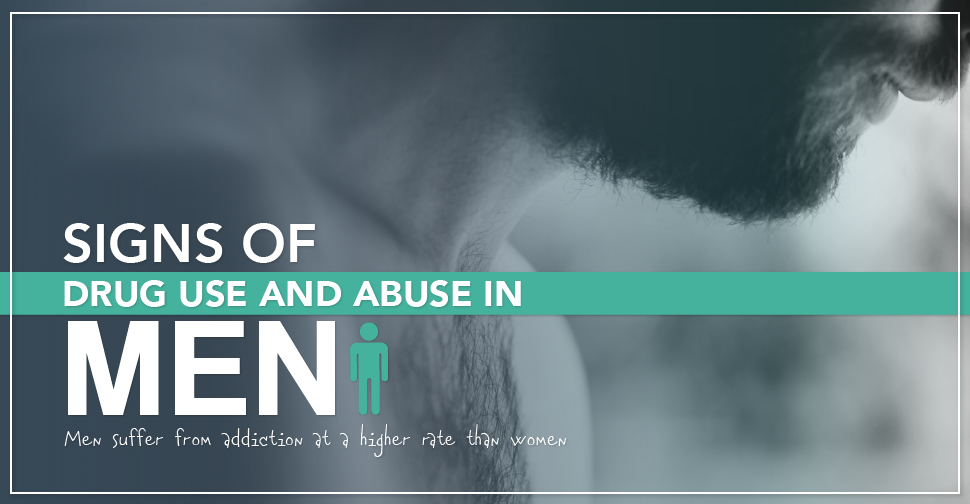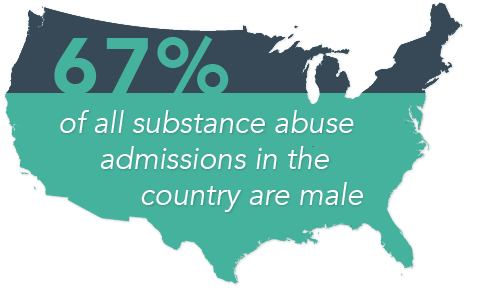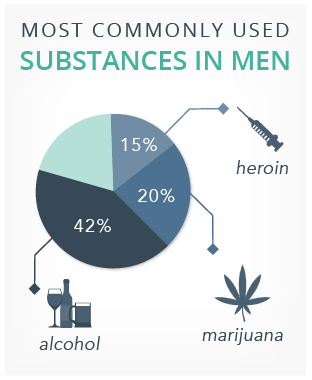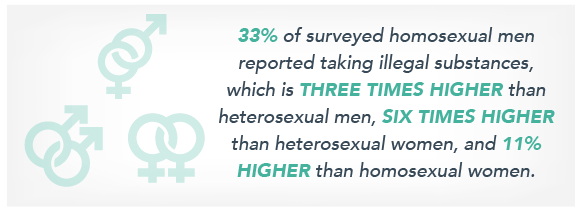
While both men and women suffer from addiction in our country, the truth is that men suffer at a rate much higher than women. This has created a near epidemic of men with addiction, a problem which may be impacting your loved one. Maybe he likes to drink beer or smoke marijuana, claiming that he doesn’t have a problem, but you’re worried that he might.
Understanding the statistics behind men and addiction, the influence behind these high rates, and the signs of addiction present in the three most commonly abused substances will help you better understand whether or not your loved one is suffering from a major problem.
Statistics Reveal A Major Epidemic
Fully understanding just how much addiction impacts men is important. The addiction rates between the genders have been studied multiple times and just about every single study has confirmed the same result: men suffer from addiction at a higher rate than women. This is typically an across-the-board result that is common for just about every drug and substance that can be abused.
A treatment episode data sheet by the Substance Abuse And Mental Health Administration reported that around 67 percent of all substance abuse admissions in the country are male. The interesting thing is that this proportion generally holds up across the various age, race, and ethnic groups. While some ethnic groups may be more prone to being addicted to different substances, men always suffer from higher rates of addiction than women, almost exponentially so.

Why are addiction rates so high in men versus women? There are many possible explanations and understanding them fully can help you gauge what might be causing your male loved one to use drugs. One explanation is the different behavior expectations for the genders. Dr. Jane Marshall of the NHS South London And Maudsley Hospital believes that “Historically, women have had less freedom to use drugs. There are different expectations of them, and they probably have different expectations of themselves as well.”
Simply put, men are commonly using at higher rates because drug use isn’t viewed for them as it is for women. Dr. Adam Winstock, an addiction specialist, agreed saying “There’s certainly more shame and stigma around women taking drugs than there is men. Women are less likely to disclose their drug use to their peers, which in turn limits their access to controlled substances – if people don’t know they take drugs or would be interested in taking drugs, they’re less likely to be offered them.”
Interestingly, Winstock claims that he didn’t believe men enjoyed taking drugs more than women, but simply felt more open to experimenting in this way.
 Another possible influence on higher rates of addiction in men is the elevated rate of use common in homosexual men. A government drug survey found that 33 percent of surveyed homosexual men reported taking illegal substances, which is three times higher than heterosexual men, six times higher than heterosexual women, and 11 percent higher than heterosexual women. Therapist David Smallwood, an LGBT addiction specialist, believes that this high rate of addiction use is caused by trauma in childhood: “[Drug use] is a way of medicating that stress,” he said.
Another possible influence on higher rates of addiction in men is the elevated rate of use common in homosexual men. A government drug survey found that 33 percent of surveyed homosexual men reported taking illegal substances, which is three times higher than heterosexual men, six times higher than heterosexual women, and 11 percent higher than heterosexual women. Therapist David Smallwood, an LGBT addiction specialist, believes that this high rate of addiction use is caused by trauma in childhood: “[Drug use] is a way of medicating that stress,” he said.
That may explain a generally higher rate of use, but heterosexual men still use substances (11 percent) at a higher rate than heterosexual women (5 percent). The social concerns of homosexual men don’t necessarily apply to heterosexual men, so why the higher rate here? Beyond the above mentioned fact is the belief that men simply take more risks than women. A study by the Society For Judgment And Decision Making entitled “Gender Differences In Risk Assessment: Why Do Women Take Fewer Risks than Men?” found that men had a more risk-prone nature than women.
For example, they found that men were more likely to speed or drive poorly, leading to a crash rate three times higher than women. This kind of risk taking behavior may lead to men using substances with their friends and peers at higher rates than women. Another cause is the different channels to drug use that men and women take. One study by the University Of Illinois claimed that “The beginning of women’s drug-using careers are related more significantly to their relationships with men.”
This means that women are more likely to use substances if their male romantic partner or male friends do. That’s not to say that women don’t use drugs under the influence of female friends or female romantic partners, but that the general rate seems to indicate men are more prone to peer pressure and what would be considered social drug use than women, perhaps as a way to bond with other friends or to have a good time.
Now that we have a better grasp on where addiction comes from in men, we’ll take a look at the signs and symptoms of their three most commonly used substances: alcohol (42 percent), marijuana (20 percent), and heroin (15 percent). These three substances make up over three-quarters of all addiction recovery cases in men, which makes it vital to understand their addiction symptoms.

Symptoms Of Alcohol Addiction
Alcohol addiction is common for a variety of reasons, including its socially accepted nature and legality. Studies have shown that men are five times more likely than women to have a serious alcohol abuse problem and more likely to be binge drinkers. Alcohol is physically addictive, like heroin, which makes it one of the hardest substances to beat in recovery. This is also coupled with the relative ease with which most people can obtain alcohol.
Signs that your male loved one is suffering from a severe problem with alcohol consumption include:
- Drinking excessive amounts of alcohol nearly every day or every day
- Hiding drinking or drinking alone
- Driving while drunk or after drinking
- Problems at work, including drinking on the job
- Defensiveness about drinking, including denial of a problem
- Spending time with friends at the bar and coming home late frequently
- Gaining weight, due to the empty calories of alcohol, or losing weight because they aren’t eating often enough
- Inability to have “one or two,” at social drinking events and getting excessively drunk
- Strong physical cravings for alcohol or bad mood when they haven’t had anything to drink in a while – signs of withdrawal
- Nausea, anxiety, and other physical problems after quitting drinking for a period of time
For men, alcohol can serve as a socially acceptable way to bond with friends, so having two beers while watching a movie or out fishing isn’t necessarily indicative of a problem. Only through sustained and obvious struggles related to alcohol can you truly diagnose a problem. Watch out for these signs and monitor your loved one’s behavior to get a grasp of how serious their addiction may have become. An intervention may be necessary at some point.
Marijuana Dependence In Men
Marijuana, while not physically addictive, can still cause dependence due to the positive sensations it caused. According to Gantt Galloway, a scientist at the California Pacific Medical Center Research Institute, “For a lot of individuals, marijuana is pleasurable, reinforcing, and reliable. If you’re talking about someone who has a chaotic home situation, someone who isn’t doing well in school, who isn’t getting praise for good school performance, those people may be at higher risk to use marijuana and to have problems with it.”
Galloway’s quote is informative because it illustrates what often causes marijuana addiction in men: stress and anxiety. The relaxing nature of marijuana leads them to use it as a self-medication, becoming reliant on its calming effects to keep focused. Unfortunately, this can cause them to spend a lot of money and to damage their lungs and mental state by smoking too much marijuana.
If you’re worried that your loved one is suffering from addiction to marijuana, please watch for these signs:
- Smoking marijuana every day or even multiple times a day
- Showing signs of anxiety or frustration when he cannot smoke marijuana
- Signs of paraphernalia (rolling papers, joints, pipes, etc.) and the scent of marijuana in his home or on his person
- Extremely relaxed behavior with signs of cognitive impairment
- Frantic or obsessive search for new sources of marijuana, such as buying it through a dealer
- Replacing anti-anxiety medicines with marijuana without the advice of his doctor
Even if marijuana isn’t physically addictive or severely dangerous to use, it may still cause severe problems in your loved one’s life. For example, he may run into trouble with the law if smoking marijuana is illegal in your state or if he is smoking marijuana without a medical marijuana card. It can also cause problems with friends and at work or may even contribute to a car crash if he drives while under the influence. That’s why it’s still so important to get him into rehab soon.
Signs Of Heroin Addiction
Heroin is a dangerous and illegal opiate that heavily impacts men by forcing them to constantly use. If they don’t use, they will suffer from severe and painful withdrawal symptoms. The intense high and pleasurable feeling caused by heroin makes it a tough drug to crack, but symptoms of its use are typically easy to spot, due to its heavy impact on his life. Typical symptoms and signs of heroin use in men include:
- Difficulty falling asleep or falling asleep excessively (both are common symptoms)
- Stomach problems, such as diarrhea, vomiting, or a sense of “chills”
- Intense feelings of happiness alternating with depression
- Decreased cognitive abilities, including confused thoughts and paranoia
- Marks on the skin where the heroin is injected
- Breaking connection with friends and family members
- Paraphernalia of heroin use (needles, spoons, bottle caps, tourniquet, towels, cotton, pipes, matches, a portable heater, etc.)
- Nervousness and anxiety when they haven’t used lately
- Unconsciousness or inability to wake up – often signs of an overdose that requires immediate attention
The extremely physically dangerous nature of heroin addiction makes it imperative to get your loved one into a rehab center as soon as possible. Here, he will receive the help he needs to beat addiction in a safe and healing environment. Even if you suspect that your loved one has just started using, you need to get him into help immediately to avoid addiction.
Treatment For These Addictions
Addiction treatment takes on many facets, due to the uniquely complex nature of the disease. Your loved one will go through the rigors of detoxification to remove all traces of the drug from his body. This can be a physically difficult process when performed alone, but in a rehab center, he will receive commonly medications that can make the process nearly pain-free. This will eliminate a lot of stress and anxiety from recovery.
However, the most difficult part will come in assessing the psychological and behavioral reasons for his addiction. This takes a lot of focus, support, and honesty, but it must be done. Counseling in private or group sessions is likely, as is intensive psychological analysis and even medication to help treat depression and anxiety. This helps calm your loved one’s emotions and creates a more stable and understanding mental environment.

After that, he will go through treatments like yoga, meditation, and cognitive behavioral therapy to gauge the source of problematic behaviors. Yoga and meditation clear the mind and help him approach his life in an honest fashion. Cognitive behavioral therapy identifies problematic behavior and thought patterns and teaches new, positives ones to replace them. For example, it will teach your loved one how to beat relapse cravings or the need to go to the bar with relaxation methods and new sober activities, such as visiting a museum or a friend.
The best way to guarantee that your loved one beats addiction is to help him stay clean for at least five years. A study by the American Medical Association Archives of General Psychiatry found that while relapse occurred in about 40 percent of cases two years after going through rehab, after five years, there were almost no cases of relapse. The best way to help your loved one stay sober during this time is to get him into various aftercare treatment methods that are designed to promote long-term sobriety.
Aftercare treatments may include temporary placement in a halfway or three-quarterway house. These houses are sober facilities that track your loved one’s behaviors and make sure he doesn’t use. Other services, such as Alcoholics or Narcotics Anonymous can give your loved one a support group that will compel him to stay sober and help him track his progress in a positive way.
You can also help him find activities and behaviors to replace the ones that caused addiction. For example, you can schedule regular family outings with sober friends to give him a way to socialize outside of the bar. Continual family and friend support is one of the best ways to help a loved one achieve sobriety and guarantee that his treatment lasts long after they walk out of a rehab center.
Finally Overcoming Addiction
If you believe that your loved one is suffering from an addiction, it is time to help him get into an addiction recovery center. He may be willing to accept your help and seek recovery in an addiction center. Unfortunately, he may be unwilling to admit he has a problem. This is when an intervention is so important. An intervention will help him face his loved ones and understand how serious addiction has become in his life.
Don’t be afraid to reach out for help and fight for the health of your loved one. Recovering in a professional and caring rehab center is key to beating addiction and regaining a life free of substances. To learn more about how the above-mentioned treatment methods can help your loved one (or to hire an interventionist for his needs) please contact us at DrugRehab.org today.
 Our addiction specialists will work hard to carefully identify the problems that are contributing to his addiction and give him the support he needs to recover. We’ll help find a treatment center near you that has specialized treatment for men, including any of the above-mentioned methods that sound right for him. Don’t hesitate any longer: contact us now and help save his life.
Our addiction specialists will work hard to carefully identify the problems that are contributing to his addiction and give him the support he needs to recover. We’ll help find a treatment center near you that has specialized treatment for men, including any of the above-mentioned methods that sound right for him. Don’t hesitate any longer: contact us now and help save his life.
Sources
Substance Abuse And Mental Health Administration – The TEDS Report
The Telegraph – Why Do Men Take More Drugs Than Women?
Society For Judgment And Decision Making – Gender Differences In Risk Assessment: Why do Women Take Fewer Risks than Men?
University Of Illinois – Drug Use And Gender
HAP – Men And Alcohol
Healthline – Marijuana Addiction Is Rare, But Very Real
WebMd – Heroin
National Institute On Drug Abuse – Signs Of Heroin Use And Addiction
Jeremy Frank PhD – Drug And Alcohol Recovery Outcome And Success Over The Long-Term: Alcoholism And Heroin Addiction And Recovery May Not Be So Bleak


